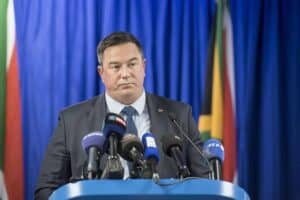DA proposes Scorpions revival, SOE reforms, decentralised policing, energy deregulation, infrastructure boost, and unemployment tackle.

The Democratic Alliance’s (DA) strategy addresses critical issues such as state-owned enterprises (SOEs), civil service reform, law enforcement and the dire economic and infrastructural challenges, says leader John Steenhuisen.
And while these might not be the sum of the problems facing the country, these issues have been ongoing and are some of the most visible.

LIVE interactive map, latest news, multimedia and more!
View MapALSO READ: ‘Multi-Party Charter the way to vote’ says Steenhuisen
Corruption has become one of the most pervasive challenges in South Africa and Steenhuisen said that once in office, the DA will resuscitate the Scorpions, the predecessors of the Hawks, that are a product of the Jacob Zuma presidency.
Combatting crime
The new Scorpions, legislated through a proposed tabling of a Scorpions 2.0 Bill during the first year of the new parliament, will comprise a multidisciplinary team focused on quality investigations, forensic capability and excellent prosecution to ensure proper convictions.
He said he knows just the opportunity to launch it, too.
“We would start with the Zondo commission recommendations for prosecution, as the trail remains freshest and we can quickly secure prosecutions.”
This, he suggested, would send a clear message that there is a new culture of accountability and that corruption will not be tolerated.
Steenhuisen said that SOEs will be considered from all angles.
“We will conduct a thorough assessment to decide whether these companies should remain under government control or be opened up to the private sector through full privatisation, or public-private partnerships,” he said.
The DA planned to end bailouts for SOEs as Steenhuisen said these subsidies reward mismanagement and perpetuate corruption.
“This approach will force necessary reforms and incentivise proper management.” Steenhuisen said a DA-run government would professionalise the public sector and ensure a clear separation between party and state.
ALSO READ: Mmusi Maimane responds to claims he turned a blind eye to corruption while in the DA
He proposed creating an independent public service commission with enhanced powers to oversee merit-based recruitment and selection processes, free from political interference.
“We will pass the ‘end cadre deployment’ Bill, making political interference in recruitment and selection a criminal offence,” he said.
When it comes to the long arm of the law, Steenhuisen plans tobring it closer to citizens by devolving policing to competent provincial and local governments. In other words, to decentralise control.
He cited the success of the DA’s Law Enforcement Advancement Plan in the Western Cape.
“Localised policing has made a significant dent in crime, with 27 000 arrests in the last year alone,” he said.
He added a DA government would recruit, equip, train and capacitate officers and detectives to improve the quality of court dockets and harness new technology such as drones, AI and facial recognition to enhance policing.
The energy problem
Steenhuisen said that ending the government’s monopoly on electricity generation and supply would be his priority in office.
“This is an essential first step, as you cannot attract investment or stimulate economic growth to create jobs without energy in your economy,” he pointed out.
Maximising the amount of power going into the grid from independent power producers (IPPs) and the private sector would lead to a massive leap in supply, he said.
A deregulated energy, rail and port network is also on the party’s cards. But tackling load shedding and the more recent scourge of water shedding are a priority overall. He said that these are fundamental to economic activity.
As president, Steenhuisen he would repeal the controversial National Health Insurance law and return it to parliament for proper legislation that would result in real universal access to basic health care.
Election battleground: An EFF-ANC coalition could help Panyaza return as Gauteng premier
“We will see a partnership between the private and public sectors, with our social reinsurance model and effective management of public health care facilities lowering costs and improving services for all citizens,” he said.
A DA in power, said Steenhuisen, would focus on road, rail, and port infrastructure through public-private partnerships to manage and upscale repairs and construction.
“Government does not have the financial resources to do this alone and such a model has been proven to boost infrastructure-led growth globally,” he explained.
Tackling unemployment swiftly is another priority in Steenhuisen’s plan of action.
He said that would be achieved by creating a better macro infrastructure for economic growth and an enabling environment for business, entrepreneurship and innovation.
It demands a focus on key infrastructure such as roads, rail, ports, water, sanitation and electricity.
“Economic growth is impossible without this,” he said, adding that slashing red tape and attracting high labour-intensive manufacturing jobs would play a significant role in achieving growth.






